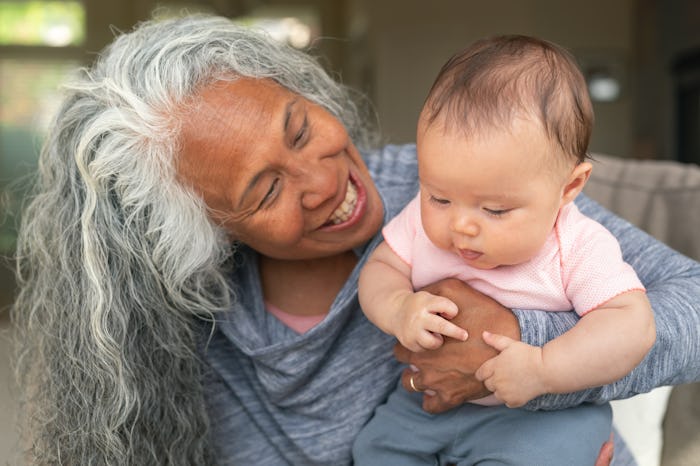Life

Deciding To See Grandparents During The Pandemic — Expert Advice On Risks & Rewards
After months of isolation, the impact of long-term separation from family and friends is taking a toll. Video calls don't allow for the same type of physical interaction that an in-person visit does, and as lockdown restrictions ease, some parents are assessing the risks of seeing grandparents now.
"Grandparents and grandchildren have both sustained losses during this pandemic by the loss of personal contact with friends, family and loved ones," Richard S. Victor, an attorney, grandfather, and founder of the Grandparents Rights Organization tells Romper. "This means that time, otherwise available to have shared memories and experiences, now will be lost or just different."
If your family is anything like mine, you may have lost precious face-to-face time with older loved ones due to social distancing orders. Although this is time we cannot get back, families now face the challenge of determining when it is appropriate to resume direct contact with loved ones — especially as elderly relatives request social visits for the sake of their own mental wellbeing.
"The situations are highly variable across families," Dr. Sharon K. Inouye, MD, MPH, Professor of Medicine, Harvard Medical School and geriatrician at Hebrew SeniorLife tells Romper.
Inouye explains that for some, contact with grandparents may have increased as those living in apartment buildings, nursing homes, or assisted living facilities moved in with their adult children due to safety concerns. Alternatively, some families have increased virtual communication in order to help maintain connection. "However, in perhaps the majority of cases, contact has been decreased or nil," she says. "For some grandparents, the separation has been extremely difficult. Many grandparents participate in the care of their grandchildren — and so this loss has been particularly acute."
Experts agree that the situation has taken a toll on many families, putting the mental and emotional health of our elderly population at risk.
"We know isolation and loneliness can lead to all sorts of adverse health outcomes in the long-term," Dr. XinQi Dong, MD, MPH, director of the Institute for Health, Health Care Policy and Aging Research at Rutgers University tells Romper. "Our research with older Chinese adults, in particular, who also may be facing risk factors related to discrimination during the pandemic, has found that isolation and loneliness are strongly associated with poor cognitive function and elder mistreatment and abuse. Furthermore, elder mistreatment is associated with significant morbidity and mortality."
To mitigate the potential long-term impacts of isolation, some families may consider resuming in-person visits while taking extra care to prevent viral spread. Internist and gastroenterologist Dr. Niket Sonpal tells Romper that families must individually assess the risks associated with seeing your children's grandparents or great-grandparents in person.
"The first thing to do is talk to your parents' general practitioner about their state and ask for their opinion on how to go about visiting the grandparents," Sonpal says. "Some grandparents may be more compromised than others, especially if, on top of age, they have other conditions like diabetes, high blood pressure, or a further weakened immune system."
Additionally, taking stock of your own household's health and risk factors, as well as your ability to follow social distancing measures (toddlers aren't great at this, FYI) if you do decide to make the move to in-person visits.
"Even if all the stars align, you would do best to meet grandparents in the outdoors, allowing the family to reunite in person, with masks and hand sanitizer readily available," Sonpal says. "Keeping the recommended 6 feet distance, for now, maybe recommendable, depending on whether you have an essential worker in your household or not, someone who has been exposed regularly to large numbers of people."
Once you have weighed all of the potential risks, if you decide not to resume in-person visits, grandparents might protest. I've seen this happen in my own family. Even when grandparents are begging for "just one measly hug," it might not be safe considering the health of all involved.
"This issue speaks to the emotional relationships and supports that the elderly crave. They want to feel loved and cherished the same as everyone else. And in this time, we should think about how to meet those needs and be connected in safer ways," Dong explains. "What are parents or grandparents really asking for? Are they saying, 'I’m willing to risk my life to see my grandchild?' Yes, of course. But, there are other ways to do it that might not require such a risk."
Maintaining connection and relationships with your elderly family members despite social distance can still help prevent emotional distress. "All efforts should be made to maintain contact — including telephone and remote visits, sending pictures and videos. These will really help to minimize the long-term impact," Inouye tells Romper.
"It is important for grandparents who have maintained relationships with their grandchildren before the pandemic continue the special times together with their grandchildren," Victor says.
Victor himself has maintained his own relationship with his grandchild throughout the pandemic via "virtual" breakfast dates. "We never did that before the pandemic, but over the past several months we have created a new 'special memory' of our time together," he tells Romper. "Grandparents/grandchildren and families should use this time to be creative and unique in how they will teach each other how we will all get through this together."
Experts:
Sharon K. Inouye, MD, MPH, Professor of Medicine, Harvard Medical School and geriatrician at Hebrew SeniorLife
Dr. XinQi Dong, MD, MPH, director of the Institute for Health, Health Care Policy and Aging Research at Rutgers University
Dr. Niket Sonpal, New York-based internist, gastroenterologist, and adjunct professor at Touro College
Richard S. Victor, PLLC, attorney and founder of the Grandparents Rights Organization